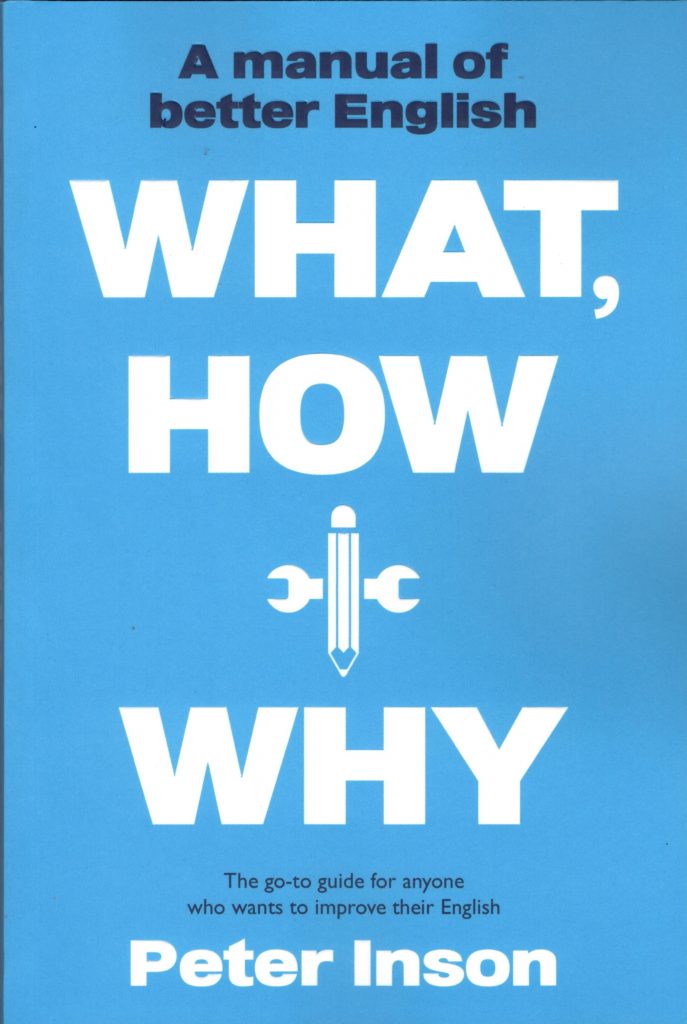What, How and Why A manual of better English
For anyone concerned about better English – parents, tutors, teachers, employers, and students. For anyone who wants to help.

“The kind of text which we need in the education system in this country – a rich and wide-ranging resource for teachers and learners.” Tim Oates – Group Director – Cambridge Assessment
“The idea at the heart of this work is extremely valuable; there is excellent material here.” Bruce Gillham – Former President United Kingdom Reading Association
“Awesome – clear, easily accessible, interesting and a friendly tone. Fabulous stuff!” Liz – tutor
An introduction
You may be reading this because you are concerned about your English. You may be reading this because someone else is concerned about your English.
Does English matter?
Yes. It matters a lot.
English, our language, is what allows us to communicate everything we know. If we fail to communicate clearly, whatever we know is lost.
This is something by which other people judge us, especially employers.
This manual will help you understand the way that we use our language so that you read and write effectively, as an educated adult who writes confidently and can check his or her own work.
Now you can be as good as anyone else.
Want to understand something so that you can use it properly? Then take it to bits. Yes. You can even dismantle the English language!
Look, my first car, a Ford Prefect which cost me £10.

I neglected it – no oil.
Bought a replacement engine.
Dismantled it to see how it worked.

Piston rings – replaced to reduce oil consumption.
Exhaust valves – reground.
Engine – de-coked to improve performance.
Twenty-four hours later I pulled the starter and the engine sprang into life: one of my proudest moments.
I GOT THE CAR RUNNING BY LEARNING HOW IT WORKS.
Now we are going to dismantle English so that you can learn to use it well.
If you can follow this you will succeed with the rest of the book.
A TASTE OF WHAT’S TO COME – LOOK AT THREE SENTENCES.
To study your own language is different from studying anything else. An engineer can leave a machine in pieces and forget it when he goes down to the pub but we have to continue using our language even when we are studying it. So, I’d like a pint.
Let’s look at the final, short sentence, So, I’d like a pint. This is what is important:
- It follows a sentence which is long and complicated. A break is welcome, a short sentence with a single, simple idea.
- The capital S at the start reminds us that we have come to a new sentence, that we might have to take a breath if we are reading aloud, and that a pause will allow more of the previous, long sentence to sink in.
- The word So, followed by a comma, commands attention before the speaker tells everyone what he or she would like to drink.
- The full stop at the end makes it clear that there is nothing more to say. The speaker could have gone on to say just what was wanted: a pint of orange squash, tea or a favourite beer. Perhaps there was no need to say exactly what was wanted because he or she was among friends.
Not one of these points is difficult. These are not new ideas. These are ideas that you carry around with you because you carry the English language with you. I couldn’t explain these things to you if you didn’t.
All I have done is to help you to understand what you already know.
THINGS YOU CAN DO TO IMPROVE YOUR ENGLISH
Read for a minimum of ten minutes every day.
Choose a newspaper or magazine, a book or nonconventional or electronic, fiction fiction. If you can’t get on with it after ten minutes find something else for tomorrow. Read things with ordinary sized print, not pages of pictures or headlines. Further help can be found later in the book.
Write for five minutes a day – a mini-blog perhaps. Try to write in complete sentences – just few lines of your own thoughts or observations about anything you like. Read it aloud to yourself; then keep it as a diary or throw it away.
Whatever else you do
Ignore anyone who tries to tease, mock, embarrass or ridicule you about this; you are doing something important to help yourself. These people will not be around when you need a job or opportunities to make something of your life. Adults make their own choices for their own reasons, not other people’s.
Contents
Part One
Components of the language
Chap 1. Words and their Work 1
Sounds that mean something and become words
Different jobs for different words – parts of speech
Chap 2. Words and their Work 2
How words become expressions, phrases, clauses and sentences
Subject and predicate – What a sentence is about
How we pick up words – learning from reading
Listening and speaking
Chap 3. Punctuation 1
Capital letters, full stops, dashes, hyphens, colons, semicolons, brackets and apostrophes
Chap 4. Punctuation 2 Commas
Pauses, direct speech, inverted commas/speech marks and reported speech, lists, phrases and clauses used in apposition – repeating information to make it clearer
Separating and redirecting items – defining and non-defining phrases and clauses – organising information clearly
Part Two
Assembling the components – Understanding, analysis and effects
Chap 5. Sentences – composed
Simple, compound and complex – how sentences are put together
Balanced, loose and periodic – getting the message across
Chap 6. Clauses
Analysis – see how groups of words work together
Subject and predicate again – more work on the importance of knowing what it is that we are talking about and what we are saying about it
Chap 7. Key ideas
Précis, summary – getting to the point, to the heart of the matter. CVs
Chap 8. Questions – beyond multiple choice and tick-boxes
Different kinds of questions. Key words and ideas. Relevant answers
Comprehension questions – demonstrate your understanding
Checking your answers
Chap 9. Strengthen your comprehension skills
Journalism from around the world
Show how well you really understand English
Chap 10. Questions – Challenges to our understanding
Assembling answers – Discovering and choosing components
Chap 11. Sentences – functioning
Indicative/interrogative/imperative/subjunctive moods
Statements, questions, instructions, wishes and hopes and exclamations
Implicit and explicit meaning
Passive and active voices
Fact and opinion
Chap 12. Sentences – assembled and put to work
Application and purpose
Chap 13. Paragraphs
Accounts, articles, contracts, essays, letters, reports, stories, description, discussion, enquiries, entertainment, information, instruction, invitation and persuasion
Chap 14. Bogey-men
Grammar – easier than you think – linked to punctuation
Spelling, handwriting, redundant words
Chap 15. Your writing
Speech into writing. Varying how we write it – greater variety of expression in writing. Writing for a variety of purposes
Planning a piece of writing. Making notes. Trying it out
Organising our words. Testing our writing
Building confidence
Glossary and links to the UK national curriculum
Items from the National Curriculum Glossary
Essentials
For tutors – ways to engage students with the material
For students – reminders for students in a hurry
For students and tutors – together for Chapter Eight onwards
